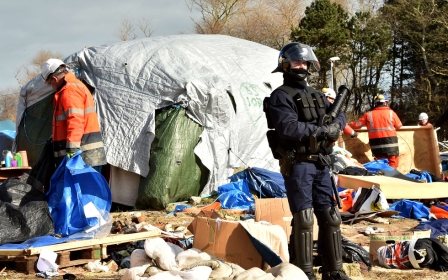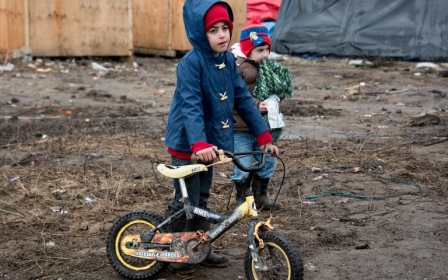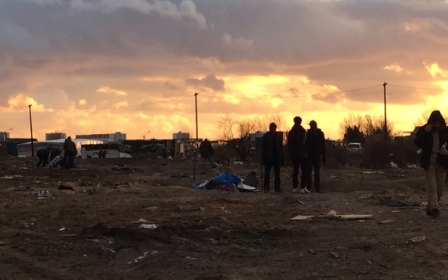Aid convoy for Calais halted in UK on French ban

A British convoy of around 250 vehicles carrying aid intended for migrants and refugees camped in and around Calais departed from London on Saturday but was stoped from leaving Britain.
After gathering near Parliament, the convoy set off for Dover at around 0900 GMT and was hoping to reach northern France by ferry at around 1400 GMT. However, following requests from the French, British authorities intercepted the convoy at the English port town of Dover and refused to allow the activists to board the boats and cross the channel.
Activists are now making their way to the French Embassy in London to protest the restriction.
"This is a disgraceful attack on both the refugees, some of the most desperate people on the planet, but also an attack on our rights," Sam Fairbairn, national secretary of the People's Assembly, one of the convoy organisers, said in a statement.
"The truth is the French and British governments are embarrassed by the situation in Calais, and their response to the crisis reflects the utter contempt they have for the refugees. We won't let the refugees be forgotten, and this decision to ban the aid convoy will only fuel the anger that so many people already have about this unnecessary humanitarian crisis."
Steve Sweeney, a spokesman for the group, told the Guardian that the convoy was separated from other cars and vans, although a truck with food was allowed to make the crossing.
“It seems like a concerted effort stopping us from making the crossing,” Sweeney said. “All the vehicles have been moved into a separate lane, it’s incredible. A few cars have made it to France, but they are being stopped there apparently.”
Social media accounts linked to activists have since shared pictures of people protesting at the port, holding signs saying "refugees welcome".
Fairbairn told AFP as the convoy set off that there were more than "250 vehicles, including a 38-tonne lorry full of aid, are on the convoy".
Local authorities in the Calais region have taken out a public order injunction against the convoy, which had initially planned to go to the so-called Jungle camp in Calais.
The Stop the War group, which is also taking part in the initiative, said the distribution point had been changed but did not provide details on where it would be.
"Our support for the refugees remains unwavering as their predicament becomes ever more fragile and uncertain," the coalition behind the Convoy to Calais initiative said in a statement on Friday.
"We have therefore decided to go ahead with the convoy and have found an alternative venue in France."
They said they were "extremely disappointed" by the ban.
French police justified the ban citing security concerns, pointing to the major deployment in place for the Euro 2016 football championship and the demands of counter-terrorism.
Around 4,000 migrants and refugees, many from Afghanistan and Sudan, live in the Jungle camp in Calais, according to an official estimate from April.
Convoy organisers claim the number is closer to 5,000.
New MEE newsletter: Jerusalem Dispatch
Sign up to get the latest insights and analysis on Israel-Palestine, alongside Turkey Unpacked and other MEE newsletters
Middle East Eye delivers independent and unrivalled coverage and analysis of the Middle East, North Africa and beyond. To learn more about republishing this content and the associated fees, please fill out this form. More about MEE can be found here.




